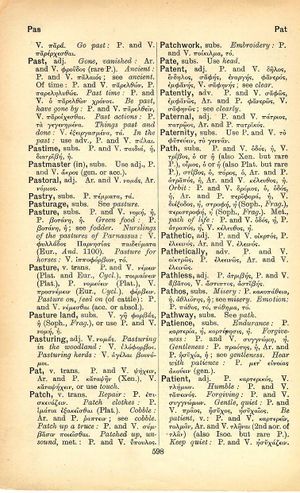pathos
Ὥσπερ αὐτοῦ τοῦ ἡλίου μὴ ὄντος καυστικοῦ, ἀλλ' οὔσης ζωτικῆς καὶ ζωοποιοῦ θέρμης ἐν αὐτῷ καὶ ἀπλήκτου, ὁ ἀὴρ παθητικῶς δέχεται τὸ ἀπ' αὐτοῦ ϕῶς καὶ καυστικῶς· οὕτως οὖν ἁρμονίας οὔσης ἐν αὐτοῖς τινὸς καὶ ἑτέρου εἴδους ϕωνῆς ἡμεῖς παθητικῶς ἀκούομεν → Just as although the Sun itself does not cause burning but has a heat in it that is life-giving, life-engendering, and mild, the air receives light from it by being affected and burned, so also although there is a certain harmony and a different kind of voice in them, we hear it by being affected.
English > Greek (Woodhouse)
subs.
Misery: P. κακοπάθεια, ἡ. ἀθλιότης, ἡ; see misery. Emotion: P. πάθος, τό, πάθημα, τό.
Latin > English (Lewis & Short)
păthŏs: n., = πάθος,
I pathos, tender or passionate feeling: movere, Macr. S. 4, 6, 6; 13: permovere, id. 4, 6, 10.
Latin > French (Gaffiot 2016)
păthŏs, n. (πάθος), la passion, l’impression vive, l’émotion : Macr. Sat. 4, 6, 1 ; 4, 6, 10.

